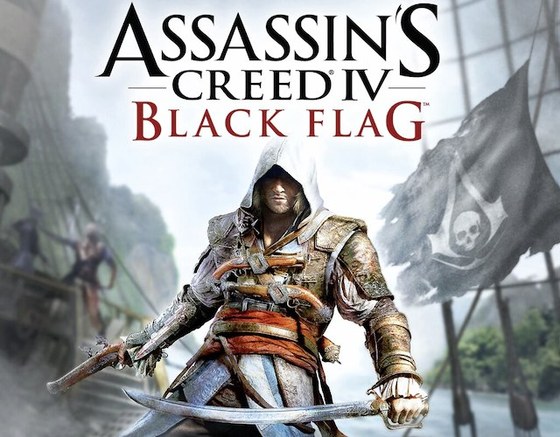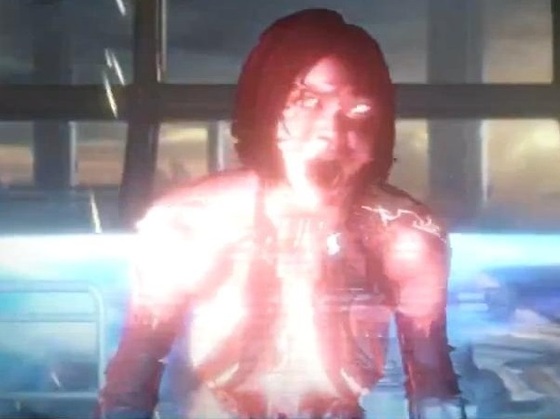6 Ways Assassin’s Creed IV is Worth Your Booty (and 4 Ways It Walks the Plank)
 |
Since 2007, Ubisoft’s Assassin’s Creed franchise has redefined the third-person adventure game. For the uninitiated, the series thus far has told the tale of Desmond Miles, a bartender who is forced to explore the genetic memories of his ancestors using a device known as an Animus. Through this genetic wayback machine, he’s explored the lives of several relatives who were members of the Assassin’s Brotherhood through the Crusades, Renaissance, and more recently, Colonial America.
The latest in the series, Assassin’s Creed IV: Black Flag, deviates from this formula in that instead of controlling Miles in the real world, you instead are at the helm of an unnamed new hire at the mysterious entertainment arm of Abstergo Industries, tasked with exploring the now cloud-based genetic memories of Desmond, specifically the Pirate/Assassin Edward Kenway. With the forthcoming avalanche of new gaming systems on the horizon, Ubisoft has pulled out all the stops to make Assassin’s Creed IV relevant for both current-gen gamers as well as those who’ve already pre-ordered their Xbox One and/or Playstation 4. The question is…did it work?
Thankfully, what is likely the last Assassin’s Creed game for current-generation systems is also the best entry to date. By no means a flawless game, it’s an amalgam of the best the series has had to offer to date, with a few unexpected bits mixed in. Here are the reasons why Black Flag is worth every piece of eight it costs, and the few reasons why it’s not flawless.
1. Funky Nassau – The Environment
The Assassin’s Creed series has always been known for its stellar environments. For its time, the original title even displayed the Crusades impressively, and the series has continued to improve the depiction of history with every release. Assassin’s Creed IV, instead of being a slight improvement on the compelling setting of its predecessor, is leaps and bounds better. The already impressive cities are teeming with life and culture, with subtle touches like period songs adding to the realism. If that weren’t enough, the inclusion of seemingly boundless naval exploration makes this digital recreation of the Golden Age of Piracy incredibly absorbing.
2. Dead Men Tell No Tales – The Story
A large role in the plot of the previous games in the series was the modern-day character Desmond, the bartender turned genetic time traveler. While his story was interesting, the potential stories of his genetic ancestry seemed to be far more compelling, and in earlier games, less explored. Assassin’s Creed IV changes the focus to Edward, one of the genetic memories now located on the “cloud”, and replaces the real-world protagonist with an unnamed, generic character. This is particularly important, because Edward seems to be the most emotionally gripping character of the series. As explained in the beginning, his motivations for beginning his quest are based on both love and finances, not a devotion to a cause. As the game progresses, his evolution as a character becomes one of the most important aspects of the game, providing an incredibly rewarding experience.
An aspect that I particularly enjoyed was that the game does not play the role of Captain Obvious. Instead, secrets are carefully spilled over time with tremendously good pacing. Just when you start to feel like the game is slowing down, another piece of the puzzle is revealed, sparking the need to play on. Additionally, the game becomes much more open and accessible quickly, unlike its predecessor which took way too much time to realize itself. This makes Assassin’s Creed IV easily the most accessible game of the series for both veterans and beginners alike.
3. Yo Ho, Yo Ho – The Music
I can’t recall a game in the Assassin’s Creed series where the music was lacking. Instead, good music has only become better as the series progressed. This time, stepping into the role of composer is Iron Man 3 and Children of Dune’s Brian Tyler. It’s the first time the series has hired a top-tier Hollywood composer, and the results are spectacular.
If for some reason Hans Zimmer were to drop off the face of the earth before scoring the forthcoming (fifthcoming?) Pirates of the Caribbean film, Disney should already have Tyler on speed dial. He’s composed a dynamic score perfect for swashbuckling, without even coming close to Zimmer’s work which has become synonymous with pirates in pop culture. The realism of the game also benefits from the inclusion of period music, particularly your crew’s singing of shanties as you sail the seas. More than once in my many hours of playing, I caught myself singing along with my pirate crew; all I was missing was some rum.
4. Good Bye, Fare Thee Well (to Your Social Life) – The Endless Activities
I come from an era in gaming where, for the most part, the job was to get from point A to point B. Even the first open-world games like The Legend of Zelda were still rather goal oriented, and had to be played in a somewhat sequential order. As games like Grand Theft Auto 3 moved us into the realm of open-world/sandbox-style gaming, gamers with limited attention spans such as myself were easily distracted from quests when there was so much fun to be had trying to get that wanted meter high enough to involve the Army. Sit me down with a copy of Grand Theft Auto 5 and within seconds I will be distracted by something shiny.
That being said, the amount of activity in Assassin’s Creed IV is beyond belief. Sure, you have the missions that advance the plot, but why do that when you can freelance as an Assassin, explore seemingly endless terrain, pillage and plunder the high seas, get into drunken bar fights, hunt and skin animals for crafting, set up ports of your own, upgrade your ship, play board games, search for buried treasure, piss off ye olde PETA by whaling and so much more. I spent the first few hours of play trying literally everything it had to offer, so much that by the end of my first night of gaming, I hadn’t even finished Sequence 2. The amount of side-quests rivals that of modern Batman games, and all of them have some level of value (except maybe the board games, unless you are a virtual board game junkie).
5. Naval Gazing – Ship Combat
Aside from playing the Commodore 64 classic Broadsides, I’ve never been particularly interested in playing a classic naval combat simulation, until now. The moment you step foot aboard the Jackdaw and set out to sea, you’ll know you are in for something special. Between the pitch of the boat, the spray of salt water, the breaching of enormous humpbacks (whales, not people Scotty), and the endless sound of shanties sung by your crew, you can almost imagine the smell of the sea air. Add naval combat to that mix, and you have one hell of a seafaring simulation, regardless of it’s place in Assassin’s Creed lore.
Combat is simple to learn, hard to master, and incredibly gratifying. Seeing the hull of an enemy ship splinter thanks to a perfectly timed broadside brings immense satisfaction which only grows more intense as you take on larger vessels. It’s good to see that Ubisoft invested time and energy into this aspect of the game. While some sequences like the much criticized optional whaling portions play more like a mini-game, the developers could have easily taken the quick approach and made naval combat into a rail shooter. Instead, they present us with naval combat which, with a little more depth and the proper story, could be a game all its own.
6. A Portable Pirate’s Life for Me – The Assassin’s Creed Tablet Companion
When I received the press kit for Assassin’s Creed IV, I was intrigued and quite a bit skeptical when I read that on launch day, a mobile companion app would be available for both Apple iPads and Android tablets. But what I was expecting to be just a marketing add-on turned out to add a whole new level of interactivity for players.
The Assassin’s Creed IV Companion App is literally connected to the console game experience. Use the app in-game and you have instant access to a larger and more detailed game map, a progress indicator, documents and your collection of treasure maps. As if this weren’t enough, you can use the tablet app while not actively playing and receive in-game benefit. Documents you find in-game are available in your tablet library for reading later when you’d rather not take a break from the in-game action. You can manage your pirate fleet, dispatching your ships on trade missions that bring you game currency, upgrades and special items. And yes, you can even listen to your collected shanties.
Ubisoft has taken the basic concept of the Wii U tablet and gone leaps and bounds beyond by designing an app that is easily accessible without having to buy a console from the Big N. In today’s mobile gaming market it’s the natural progression, and I’ll be curious to see how many other companies go this route in the coming years. One thing is for sure: this is game design at its finest, and an absolutely genius move for Ubisoft.
The Meh (Because nothing is particularly bad, just needing improvement)
1. Pirate Pedicure – Polish, or Lack Thereof
 |
| massdistraction |
Some good games are made great by their attention to detail. Some excellent games are reduced to only greatness thanks to the lack of polish, a situation which Assassin’s Creed IV fell in quickly.
A lot of the polish issues were minor: a text document early in the game had two sets of the same pages, subtitles inexplicably had random words capitalized, NPC characters would rez directly in front of me from out of thin air. It wasn’t enough to spoil the game, but enough to be distracting, particularly in the beginning of the game. As the game progressed it seemed to have less issues, or it had me so engrossed that I no longer noticed them; a success either way.
It’s next to impossible to release a title with zero bugs, but for an AAA title like Assassin’s Creed, I expected there to be more quality control. The lack of attention to detail feels like an attempt to rush out a product quickly enough to sell copies before the next generation systems release in a few weeks. While indeed Assassin’s Creed IV should sell well on both the Playstation 4 and Xbox One, today’s economy will limit how many people upgrade to new systems, and it’s unlikely that new console sales will adversely impact sales of the game for current generation systems. Instead of rushing, Ubisoft would have been better served spending another month or so ironing out the kinks on all system releases.
2. “…the opium of pirates is actual opium.” – The AI
 |
It’s safe to say that artificial intelligence is still pretty much in its infancy. Aside from Microsoft announcing that they are creating an AI based on Cortana from the Halo series for their smartphones, it’s safe to say that we don’t have to worry about Skynet (at least for five years, after which all Windows Phones will develop rampancy). AI in a video game is supposed to make characters act somewhat human-like. Instead of a Goomba walking forward until it hits a wall and turns around, most games now have bad guys who actively seek your character out. A game like Assassin’s Creed which focuses on the concept of stealth, depends on having an AI system that responds to threats appropriately.
Some aspects of the AI system in Assassin’s Creed IV are fantastic. Whistling to a potential victim from the brush will attract their attention, drawing them in for the kill. Tossing a sack of money will often send greedy guards off for a quick payday, allowing you to sneak by undetected and less blood soaked. Unfortunately, there is a distinct lack of consistency with the AI of characters. If you are spotted from a distance and quickly dash into cover, the enemy will usually blow it off like a figment of its imagination. Often though, an enemy can be mere feet in front of you, and a quick dash into a nearby haystack or leaf pile results in the enemy also thinking you’re a figment. Jumping out of the bushes to slit a throat makes perfect sense in the game, but doing it literally in front of another enemy will likely go unnoticed. While some situations require the hiding of bodies, generally speaking, a corpse will generally be ignored. It’s that lack of consistently that had me no longer caring so much about being stealthful, aside from the missions that required me to do so, and in doing so took away from the game.
3. Play on, Me Hearties – Multiplayer
For a game the size and scope of Assassin’s Creed IV, there really isn’t a need per se for multiplayer. The stand alone content (as well as the forthcoming DLC) is well worth the price of admission. That being said, the inclusion of multiplayer, while not feeling tacked on out of necessity, isn’t particularly compelling. While Wolfpack mode is great with a group of friends, some of the other modes range from mildly entertaining to downright infuriating.
I will point out that multiplayer in Assassin’s Creed is a much different experience than typical multiplayer fare like Call of Duty. There are moments when it stands out, especially the introduction sequence by Abstergo Entertainment, and some of the more interesting game modes like “Wanted” can be a hoot if played with a good group of competitors. The unique style of play may turn off some gamers, but you aren’t really missing anything by avoiding multiplayer. The real wonder of the game is contained in its single-player campaign.
4. “If the Pirates of the Caribbean breaks down, the pirates don’t eat the tourists” – The Control
The most frustrating aspect of Assassin’s Creed IV is the inconsistencies with the controls. At times, the controls are crisp, tight, and amazingly responsive, particularly in combat. In fact, this is the first game in the series in which I have specifically enjoyed combat, which feels like it was lifted directly from the Batman Arkham series, but the all too frequent chase sequences had me wanting to heave my controller against a wall.
Free running has always been a part of the Assassin’s Creed series, and it makes for some very exciting sequences; chasing down your prey as you scale walls, leaping between rooftops, and dodging the gathering crowds. That thrill should be magnified when you are either chasing down a character or trying to escape from your own demise. Unfortunately, chasing down a victim is often too entirely frustrating, as you’ll suddenly stop dead in your tracks because your control stick is just a millimeter off target. Precious seconds are spent trying to re-engage the free running mode (which is just a pull of the right trigger) and finding the stick’s Goldilocks zone that takes you towards your target. Too much to the right, you don’t move. Too much to the left and suddenly you are scaling a wall rather than leaping for that post in front of you. I’ve had to replay some of the chase scenes a dozen times or more because a slight miscalculation has given my target the necessary time to escape. It’s a tolerable annoyance thanks to the overall quality of the game, but would seriously damage the experience of a lesser game.
Conclusion
Fans of the Assassin’s Creed series have nothing to fear; Black Flag is a safe and yet large step forward. Much of the concepts are just improvements on aspects of previous games in the series, but it’s where the game breaks away from the format that it truly shines. Its minor imperfections, while distracting, don’t really damage the game on a whole, and by no means should discourage you from picking this up.
If you’ve been waiting for a chance to jump in an Animus for the first time, this is your best opportunity. It’s the first time a game in the Assassin’s Creed family has ever captured my attention so rabidly, and the step away from characters past makes this entry a little easier to walk into without prior series knowledge. The only question now is how the game will be improved on the Playstation 4 and Xbox One.
Previously by Jason Helton
11 Things We Can Expect in the Future According to Buck Rogers in the 25th Century
10 Great Sports Teams of Science Fiction
